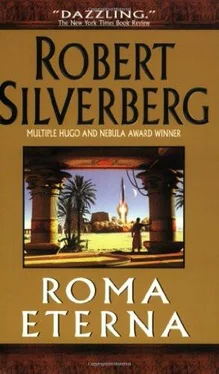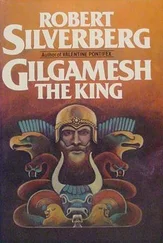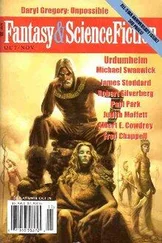Robert Silverberg - An Outpost of the Realm
Здесь есть возможность читать онлайн «Robert Silverberg - An Outpost of the Realm» весь текст электронной книги совершенно бесплатно (целиком полную версию без сокращений). В некоторых случаях можно слушать аудио, скачать через торрент в формате fb2 и присутствует краткое содержание. Год выпуска: 2003, ISBN: 2003, Издательство: HarperCollins, Жанр: Альтернативная история, на английском языке. Описание произведения, (предисловие) а так же отзывы посетителей доступны на портале библиотеки ЛибКат.
- Название:An Outpost of the Realm
- Автор:
- Издательство:HarperCollins
- Жанр:
- Год:2003
- ISBN:978-0-380-97859-5
- Рейтинг книги:4 / 5. Голосов: 1
-
Избранное:Добавить в избранное
- Отзывы:
-
Ваша оценка:
- 80
- 1
- 2
- 3
- 4
- 5
An Outpost of the Realm: краткое содержание, описание и аннотация
Предлагаем к чтению аннотацию, описание, краткое содержание или предисловие (зависит от того, что написал сам автор книги «An Outpost of the Realm»). Если вы не нашли необходимую информацию о книге — напишите в комментариях, мы постараемся отыскать её.
An Outpost of the Realm — читать онлайн бесплатно полную книгу (весь текст) целиком
Ниже представлен текст книги, разбитый по страницам. Система сохранения места последней прочитанной страницы, позволяет с удобством читать онлайн бесплатно книгу «An Outpost of the Realm», без необходимости каждый раз заново искать на чём Вы остановились. Поставьте закладку, и сможете в любой момент перейти на страницу, на которой закончили чтение.
Интервал:
Закладка:
Robert Silverberg
An Outpost of the Realm
You know your enemy from the first moment you see him. I saw mine on a gleaming spring day almost a year ago, when I had gone down to the Grand Canal as I usually do in the morning to enjoy the breezes. A flotilla of ornate Roman barges was moving along the water, shouldering our gondolas aside as though they were so much flotsam. In the prow of the foremost barge stood a sturdy dark-bearded young Imperial proconsul, grinning in the morning sunshine, looking for all the world like some new Alexander taking possession of his most recently conquered domain.
I was watching from the steps of the little Temple of Apollo, just by the Rialto. The proconsul’s barge bore three great poles from which the eagle standard fluttered, and they were too tall to pass. The drawbridge, for some reason, was slow to open. As he looked impatiently around his gaze fell on me and his bright, insolent eyes met mine. They rested there a moment, comfortably, presumptuously. Then he winked and waved, and cupped his hand to his lips and called something to me that I could not make out.
“What?” I said, automatically, speaking in Greek.
“Falco! Quintus Pompeius Falco!”
Then the bridge opened and his barge passed through and was gone, swiftly heading down the canal. His destination, I soon would learn, was the Palace of the Doges on the great plaza, where he was going to take up residence in the house where the princes of Venetia formerly had dwelled.
I glanced at Sophia, my waiting-maid. “Did you hear him?” I asked. “What was that he said?”
“His name, lady. He is Pompeius Falco, our new master.”
“Ah. Of course. Our new master.”
How I hated him in that first moment! This hairy-faced garlic-eating Italian boy, making his swaggering way into our serene and lovely city to be our overlord—how could I not detest him? Some crude soldier from Neapolis or Calabria, jumped up out of sweaty obscurity to become proconsul of Venetia as a reward, no doubt, for his bloodthirstiness on the battlefield, who now would fill our ears with his grating Latin crudities and desecrate the elegance of our banquets with his coarse Roman ways—I loathed him on sight. I felt soiled by the cool, casual glance he had bestowed on me in that moment before his barge passed under the drawbridge. Quintus Pompeius Falco, indeed! What could that ugly name possibly mean to me? I, a highborn woman of Venetia, Byzantine to the core, who could trace her ancestry to the princes of Constantinopolis, who had mingled since childhood with the great ones of the Greek world?
It was no surprise that the Romans were here. For months I had felt the Empire seeping into our city the way the bitter ocean tides slip past our barrier islands into our quiet lagoon. That is the way it is in Venetia: we shelter ourselves as best we can from the sea, but in time of storm it prevails over everything and comes surging in upon us, engulfing us and flooding us. There is no sea in all the world more powerful than the Empire of Roma; and now it was about to sweep over us at last.
We were a defeated race, after all. Five, eight, ten years had passed, already, since the Basileus Leo XI and the Emperor Flavius Romulus had signed the Treaty of Ravenna by which the Eastern and Western Empires were reunited under Roman rule and all was as it had been so many centuries ago in the time of the earliest Caesars. The great Greek moment was over. We had had our time of glory, two hundred years of it, but the Romans had prevailed in the end. Piece by piece the whole independent Byzantine world had returned to Roman control, and it was our turn to be swallowed up now, Venetia, the westernmost outpost of the fallen realm. Roman barges sailed our canals. A Roman proconsul had come here to live in the Palace of the Doges. Roman soldiers strutted in our streets. Fifty years of bloody civil war, two hundred years of Greek ascendancy after that, and now it was all nothing but history. We did not even have an Emperor of our own. For a thousand years, since the time of Constantinus, we of the East had had that. But now we would have to bend our knees to the Caesars as we did in ancient times. Do you wonder that I hated Caesar’s man on sight, as he proudly made his entry into our conquered but not humbled city?
Scarcely anything changed at first. They did not reconsecrate the Temple of Zeus as a temple of Jupiter. Our fine Byzantine coins, our solidi and miliaresia, continued to circulate, though I suppose there were Roman aurei and sesterces among them now. We spoke the language we had always spoken. Official documents now bore the Roman date—it was their year 2206—instead of using the Greek numbering, which ran from the founding of Constantinopolis. But who among us paid attention to official documents? For us it was still the year 1123.
We saw Roman officials occasionally in the plaza, or in the shops of the Rialto, or journeying in gondolas of state along the main canals, but they were few in number and they seemed to take care not to intrude on our lives. The great men of the city, the members of the old patrician class from whose ranks the Doges once had been drawn, went about in proper pomp and majesty as usual. There was no Doge, of course, but there had been none for a long time.
My own existence was as it had been. As the daughter of Alexios Phokas and the widow of Heraclios Cantacuzenos I had wealth and privilege. My palace on the Grand Canal was a center for the highborn and cultured. My estate to the east in warm and golden Istria yielded a rich bounty of figs, olives, oats, and wheat, and afforded me a place of diversion when I wearied of the watery charms of Venetia. For as much as I love Venetia I find the city’s dank winters and sweltering miasmic summers very much of a burden on my spirit, and must escape from it when those times come.
I had my lovers and my suitors, who were not necessarily the same men. It was generally assumed that I would marry again: I was still only thirty, childless and wealthy and widely hailed for my beauty, and of high family with close connection to the Byzantine imperial dynasty. But although my mourning time was over, I was in no hurry for a new husband. I had been too young when I was married to Heraclios, and had had insufficient experience of the world. The accident that had robbed me of my lord so early had given me the opportunity to make up for my past innocence, and so I had done. Like Penelope, I surrounded myself with suitors who would gladly have taken a daughter of the Phokases to wife, widow that she might be. But while these ambitious grandees, most of them ten years older than I or more, buzzed about me bringing their gifts and murmuring their promises, I amused myself with a succession of less distinguished gentlemen of greater vigor—gondoliers, grooms, musicians, a soldier or two—to the great enhancement of my knowledge of life.
I suppose it was inevitable that I would encounter the Roman proconsul sooner or later. Venetia is a small city; and it was incumbent upon him to ingratiate himself with the local aristocracy. For our part we were obliged to be civil with him: among the Romans all benefits flow downward from the top, and he was the Emperor’s man in Venetia. When lands, military rank, lucrative municipal offices became available, it was Quintus Pompeius Falco who would distribute them, and he could, if he chose, ignore the formerly mighty of the city and raise new men to favor. So it behooved those who had been powerful under the fallen government to court him if they hoped to maintain their high positions. Falco had his suitors just as I had mine. On feast days he was seen at the Temple of Zeus, surrounded by Venetian lords who fawned on him as though he were Zeus himself come to visit. He had the place of honor at many banquets; he was invited to join in the hunt at the estates of the great noblemen; often, as the barges of the wealthy traveled down our canals, there was Pompeius Falco among them on deck, laughing and sipping wine and accepting the flattery of his hosts.
Читать дальшеИнтервал:
Закладка:
Похожие книги на «An Outpost of the Realm»
Представляем Вашему вниманию похожие книги на «An Outpost of the Realm» списком для выбора. Мы отобрали схожую по названию и смыслу литературу в надежде предоставить читателям больше вариантов отыскать новые, интересные, ещё непрочитанные произведения.
Обсуждение, отзывы о книге «An Outpost of the Realm» и просто собственные мнения читателей. Оставьте ваши комментарии, напишите, что Вы думаете о произведении, его смысле или главных героях. Укажите что конкретно понравилось, а что нет, и почему Вы так считаете.












